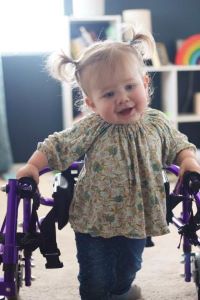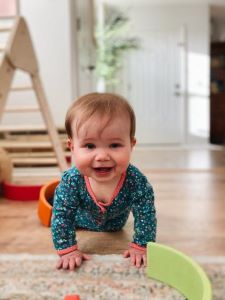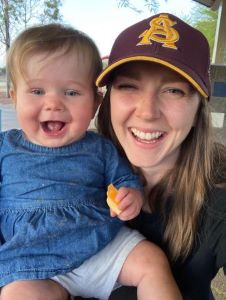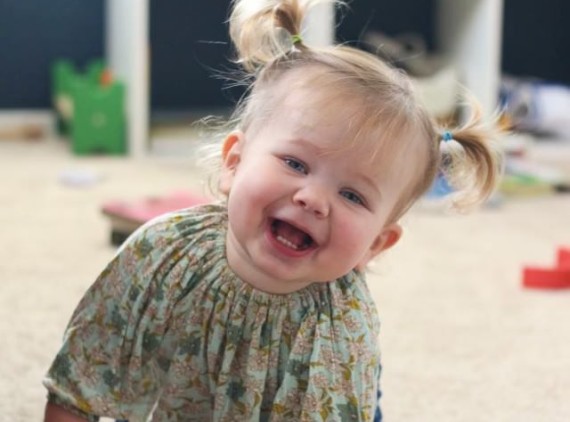- Center for Fetal and Neonatal Care
- Fetal Care
- Newborn Early Screening Team (NEST)
- Spina Bifida Clinic
An Early Spina Bifida Diagnosis Signals the Need for Prenatal Medical Intervention
Norah became a Phoenix Children’s patient before she was born.
During a routine ultrasound 20 weeks into her pregnancy, Laurelin learned that her baby, Norah, had spina bifida – a condition in which the spine and spinal cord don’t develop properly.
Each year, about 1,500 of the 4 million babies born in the United States have spina bifida, according to the National Organization for Rare Diseases. The condition can range in severity, depending on the size and location of the defect. Complications may include walking and mobility problems, bowel and bladder dysfunction, and/or accumulation of fluid in the brain.
“Our initial reaction was heavy anxiety about the unknown for Norah,” Laurelin says. “I worried this was somehow my fault.”
A Network of Care Before Birth

Laurelin was referred to Phoenix Children’s, where fetal magnetic resonance imaging (MRI) confirmed the diagnosis. The family sought guidance from the health system’s Fetal Care Center.
The Fetal Care team supports families through every aspect of their baby’s individualized care plan – from initial testing and diagnosis to comprehensive treatment and ongoing support. Additionally, the team collaborates with each family’s chosen obstetric and maternal fetal medicine providers to help ensure a safe pregnancy and delivery.
Laurelin and her husband, Jordan, learned that Norah’s spinal defect would have to be corrected, and doctors could perform the surgery in utero (in the womb) or after Norah’s birth. While fetal surgery for spina bifida does not cure the condition, research shows that in-utero surgery may improve a baby’s outcomes.
Norah’s parents only had a few days to make their decision because the in-utero procedure must be performed before 26 weeks’ gestation. Relying on their faith and their confidence in Phoenix Children’s neurosurgeon Jennifer Ronecker, MD, the couple decided to have surgery performed on Norah while she was still in the womb.
“Making the decision for fetal surgery was extremely difficult, and those few days were some of the most turbulent of my life up to this point,” Laurelin says. “There was a chance the surgery could go wrong, meaning danger for both Norah's health and my own. That's a hard pill to swallow without any guarantees.”
In December 2019, the family travelled out of state to have the procedure performed. The nearby Ronald McDonald House became their home for three months.
The surgery was a success, and Norah was delivered at 37 weeks with limited complications.
“The best news came when the neonatal team informed us that they could not find any nerve damage and that she did not at that time have any buildup of fluid in her brain,” Laurelin says. “It was the best-case scenario for results of the fetal surgery.”
Within days of her surgery, Norah returned to Phoenix Children’s to receive ongoing, specialized care close to home.
Navigating Complex Health Care Needs

Laurelin quickly realized how much support she would need to coordinate Norah’s ongoing care with medical specialists. Norah needed care from experts in neurosurgery, orthopedics, urology, and physical and occupational therapy, to name a few. The concierge approach to care Laurelin and her family experienced at Phoenix Children’s before Norah’s birth was a lifesaver. So, she advocated for a similar model to support families like hers, not only before the birth of their child but also afterward.
Laurelin’s concerns were heard – and perfectly aligned with the Fetal Care Center’s vision to provide a full continuum of care from prenatal to postnatal. Thanks to a generous donor, in August 2021, the Fetal Care Center expanded its concierge services to support families after their newborn is discharged. Care coordinators now shepherd families through the first years of a child’s life.
“Parents struggle with obstacles to care and need an advocate who can guide them in the difficult early years of a baby with a complex diagnosis,” says Kristi Boles, MD, medical director of the Spina Bifida Clinic at Phoenix Children’s. “These expanded services are a bridge for families to go from the newborn intensive care unit to the clinics where they will receive long-term care.”
The team tackles such tasks as doctor referrals, insurance authorizations and medical supply orders. Parents can call for help with challenges big and small, or even just to talk.
“We engage families in the whole process of their child’s care,” says Alicia Schmidt, MSN, RN, care coordinator. “Having this full continuum of care, with a personal touch, sets Phoenix Children’s apart.”
Monitoring Early Development
Norah also receives care from the Newborn Early Screening Team (NEST) Clinic, which focuses specifically on the development of babies born prematurely or with complex medical conditions. This multidisciplinary team sees patients every three months for the first year, then every six months or so the following two years.
“Because so much crucial development occurs in those first few years of life, the NEST Clinic is an additional service we provide for these patients and their families to ensure they are plugged in to any additional resources they may need,” says Whitney Ruben, RN, NEST Clinic care coordinator.
After Norah turns 3, her care will be overseen by the Spina Bifida Clinic, where she will have annual checkups with specialty providers – unless her care team sees a need for more frequent visits.
Reassurance for Parents

For Laurelin, Phoenix Children’s attentiveness to her needs as a parent has bolstered her confidence in Norah’s care.
“It almost feels like I’m in their care as well,” she says. “They respond quickly to my questions and concerns. It just gives me a lot of trust in them as Norah’s caregivers.”
At nearly 2 years old, Norah is thriving. Able to get around with the support of a walker, she is independent, adaptable and cheerful. Norah loves books and enjoys keeping her family laughing with her silly antics.
“Norah’s future looks incredibly bright,” Laurelin says. “I'm confident she will be resilient as she faces the challenges ahead of her and that she will do so with a massive smile on her face. We are indebted to the doctors and miracle workers who literally changed the course of our daughter’s life through this whole process.”

